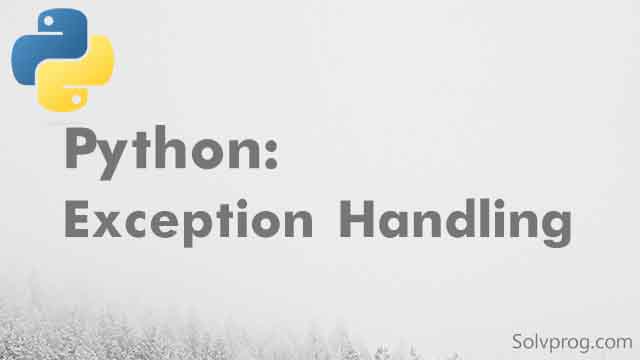Python Exception Handling

Python exception handling is a way to handle errors that might occur when running a program. When an error occurs, it's called an exception, and using the try-except block allows you to handle these exceptions gracefully instead of having your program crash.
Python exception handling is a mechanism for dealing with errors or exceptional situations that occur during the execution of a program. Exceptions are raised when an error occurs, and they can be caught and handled using the try-except block.
Here's an example of how to use the try-except block:
try:
# code that may raise an exception
except SomeException:
# code to handle the exception
In this example, the code inside the try block may raise an exception. If an exception of type SomeException is raised, the code inside the except block will be executed to handle the exception.
Here's a more complete example:
try:
x = int(input("Enter a number: "))
y = int(input("Enter another number: "))
print(x / y)
except ZeroDivisionError:
print("Error: Cannot divide by zero")
except ValueError:
print("Error: Invalid input")
In this example, the code inside the try block reads two numbers from the user and attempts to divide them. If the user enters a zero for the second number, a ZeroDivisionError exception will be raised. If the user enters a non-numeric value, a ValueError exception will be raised. In either case, the appropriate except block will be executed to handle the exception.
The try-except block can also include a finally block, which is always executed regardless of whether an exception was raised:
try:
# code that may raise an exception
except SomeException:
# code to handle the exception
finally:
# code that is always executed
The finally block is useful for performing cleanup operations, such as closing files or database connections.
In addition to the built-in exceptions provided by Python, you can also define your own custom exceptions by subclassing the built-in Exception class. This allows you to create exceptions that are specific to your application or domain.
Overall, exception handling is an important technique for writing robust and error-free code in Python. By handling exceptions properly, you can make your programs more reliable and easier to maintain.
Exception Handling Example
Here is an example code that demonstrates how to use exception handling to handle errors that may occur while processing a file:
try:
with open('file.txt', 'r') as file:
for line in file:
# do some processing
pass
except FileNotFoundError:
print("Error: The file 'file.txt' does not exist.")
except IOError:
print("Error: There was an error reading the file 'file.txt'.")
In this example, we are opening a file called file.txt and processing each line in the file. We use the with statement to ensure that the file is closed properly when we are finished with it.
However, if the file does not exist, a FileNotFoundError exception will be raised, and if there is an error reading the file, an IOError exception will be raised.
To handle these exceptions, we use the try-except block. Inside the try block, we have the code that might raise an exception. If an exception is raised, the appropriate except block will be executed to handle the exception.
In this example, if a FileNotFoundError exception is raised, we print an error message indicating that the file does not exist. If an IOError exception is raised, we print an error message indicating that there was an error reading the file.
By using exception handling, we can handle errors that might occur while processing a file and provide useful feedback to the user about what went wrong.
Exception handling is a programming mechanism that allows errors or exceptional situations to be detected and dealt with in a graceful manner. When an error occurs, it is called an exception, and the try-except block is used to catch and handle these exceptions. The try block contains the code that might raise an exception, while the except block handles the exception if it occurs. Finally, a finally block can be used to execute code that should always be executed, regardless of whether an exception was raised or not. By using exception handling, programmers can write more reliable and robust code that can handle unexpected errors in a more graceful manner.